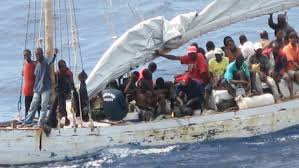After a summer of accumulating incidents along the European Union’s external borders, the plight of undocumented migrants seeking entry into Europe has captured the world’s attention following the sinking of a migrant vessel off the coast of Italy. There had already been several deadly incidents in the previous months, a continuation of a decades old problem, but it took a single tragedy with a body count in the hundreds to attract urgent attention.
A number of commentators have been sounding alarm bells over the perilous experiences of migrants passing into Europe. To those who listened, the tragedy in Lampedusa was not a surprise. Everyone recognises the scale of this catastrophe and there have been pronouncements throughout Europe about the need to make serious changes. Whether meaningful changes will actually be pursued once this disaster disappears from the headlines is unclear, but if they are not, the world can be assured that more tragedies will follow. Even if there is broad agreement about the need for change, there will likely be considerably less consensus about the specifics of any reforms.
Before the death toll was finalised, Italian officials had already crafted a political response. The Italian government has long argued that it is unfairly tasked with disproportionate responsibilities for managing migration to the EU. They were quick to reiterate this claim following this most recent tragedy. Other countries have lodged similar complaints, and their argument is not without merit. While the countries bordering the EU’s external boundaries, particularly the Mediterranean states, are inevitably the first port of arrival for many undocumented migrants, Europe more broadly defined is the true destination. Northern European countries, while more affluent, have had to exert less effort policing migration and devote far less resources to accommodate new undocumented immigrants. Although some states are understandably campaigning for changes in this regard, there is nevertheless some EU-wide involvement in the issue and funds have been devoted to managing the region’s external borders.
While inequalities in the distribution of responsibilities among member states are a legitimate concern, the tragedy in Lampedusa is a fundamental indictment of the EU’s border security strategy that cannot be reduced to imperfections in its implementation. What is needed is a recognition of the futility of managing migration through fortification in the twenty-first century. This approach invariably fails to prevent migration, renders the migratory process more dangerous, and fuels the human trafficking industry that it is ostensibly designed to undermine. Migration controls are public justified for a variety of reasons, sometimes related to national security, the assertion of sovereignty, or the protection of culture. These concerns are far from frivolous and there are, of course, many legitimate arguments for managing, monitoring, and restricting immigration levels. But the uncomfortable reality is that contemporary migration policies in the industrialised world largely revolve around keeping the poor out. Sometimes this is stated more or less explicitly when discussion of the labour market or social service expenditures enters immigration debates.
[captionpix align=”left” theme=”elegant” width=”300″ imgsrc=”http://natoassociation.ca/wp-content/uploads/2013/10/divers.jpg ” captiontext=”A boat carrying hundreds of African migrants sank off the Italian island of Lampedusa, killing hundreds. “]
The fundamental injustice of disproportionately restricting the mobility of the poor will obviously not be remedied by industrialised countries’ lifting their immigration restrictions. The fact remains that any government will usually have much more direct incentive to facilitate the movement of the wealthy and well-connected than those fleeing desperate poverty or political persecution. Furthermore, as economic circumstances deteriorate in Mediterranean countries, the idea of border liberalisation is not likely to gain currency. Instead, policy formulations regarding immigration, and any attempt to make migrant tragedies less likely, must be predicated on the recognition that undocumented migration is intrinsically tied to international inequality. Italy has claimed that the recurring events in Lampedusa are the result of the collective failure to address a European problem. This does not go far enough. It is a global, more specifically a north-south, problem.
There are measures that can be taken to ameliorate the plight on international migrants, whether it is improved marine rescue capacities, allowing migrants to launch asylum claims in non-border countries, core European states accepting a greater proportion of immigrants, or any variety of reforms. All of this, however, will do little to stem the influx of people trying to enter a continent that feels unable to accept them. This problem will only be sustainably addressed by diminishing the “push factors” of poverty, violence, and insecurity that motivate undocumented migration. This is a challenging task which should not be mistaken as a call for Europe and the rest of the industrialised world to prescribe governance strategies to the global south. Instead, policies, particularly trade, development, and security policies, should be informed by the realization that, one way or another, the prospects of the global north and the global south are intertwined.
Observers and policymakers have been conditioned to set aside discussions of inequality and concentrate purely on economic growth since the ascent of neoliberalism, but the contradictions of such an unequal international order have serious implications. The existence of suffering invisible to most Western eyes sometimes precipitates suffering that is more difficult to ignore. When people live in conditions that compel them to risk their lives to leave, unfortunate consequences can hardly be considered a surprise. These events have the appearance of a tragedy, but could be more accurately described as a failure. Europe has now been forced, at least temporarily, to recognize this failure and unless it is fundamentally addressed, the world will almost certainly be left to lament even more “tragedies” in the future.




